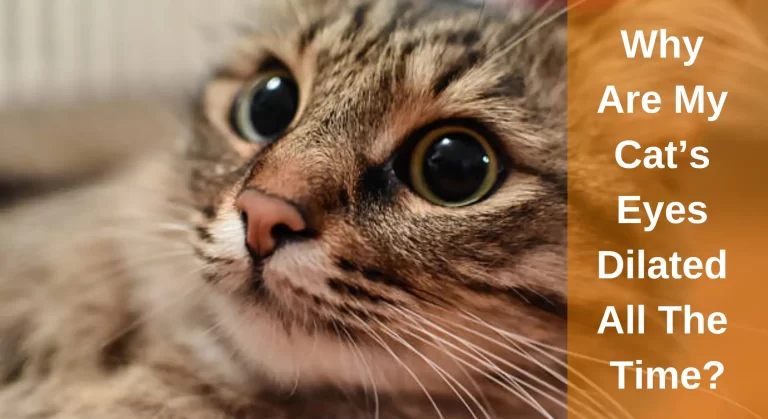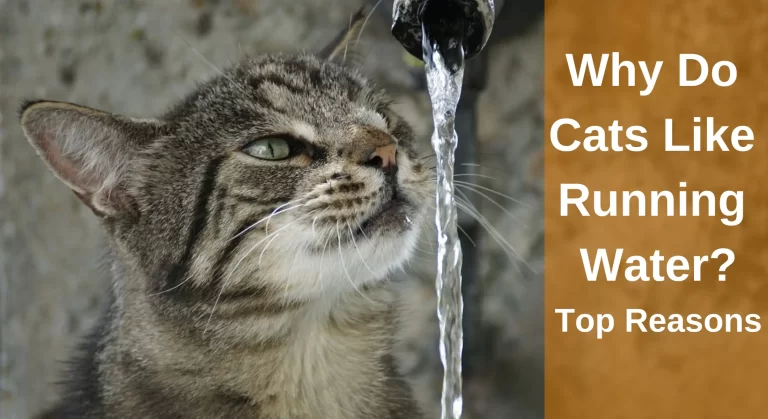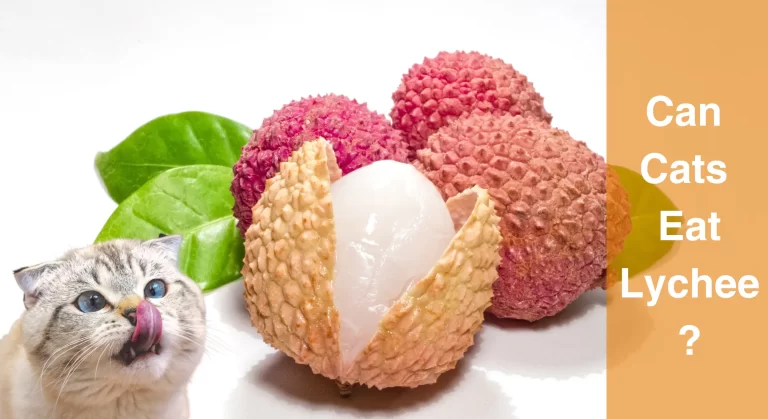Can Cats Eat Sage? Investigating the Benefits and Risks of Sage
We all begin to search for methods to engage our cats in the festivals as soon as the holidays arrive each year. Giving special goodies and sharing seasonal delicacies with cats are among the most popular ways owners try to engage their cats in the festive season. Sage is a typical component of many delicious recipes and holiday cuisines. But you may think about whether feeding sage is good for your cats or not. “Can Cats Eat Sage?”
Yes, cats can consume sage, and are not harmful only in moderation in a small amount. If your cat consumes a few sage leaves, you shouldn’t be concerned. However, as you know, cats’ digestive systems are designed for meat, thus consuming a lot of sage leads to serious digestive issues. It causes stomach distress, diarrhea, nausea, and abdominal discomfort.
If you enjoy gardening and own a cat, you are aware of how challenging it’s to prevent your feline companion from plants. The idea that sage is suitable for cats to consume does not mean you have to let your cat consume the herb blindly. Read this article, to know all the information you need about sage and cats, the risks of consuming this herb, its advantages, and much more!
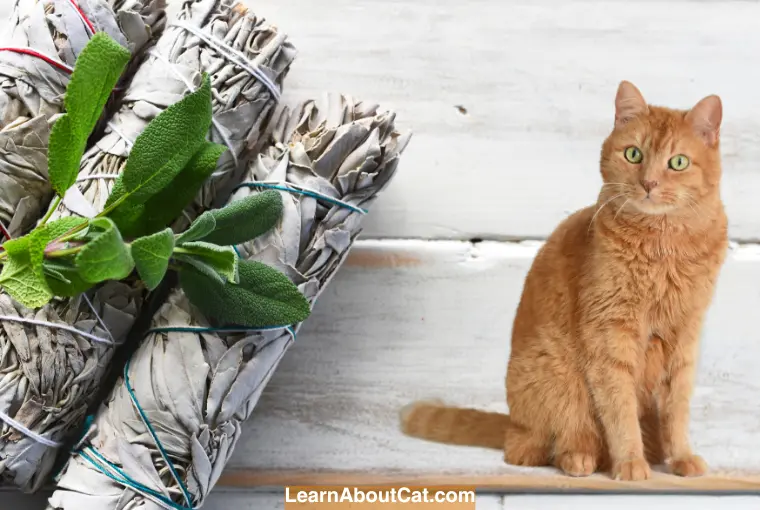
Are Cats Attracted to Sage?
Cats are drawn to a wide variety of flora. It’s difficult to determine whether sage’s aroma, broad leaves, texture, flavour, or uniqueness are what draw cats to it. As you know cats have strong smelling senses and s age has a potent, earthy perfume with deep overtones that may be unpleasant to certain people while appealing to others.
Moreover, sage lacks nepetalactone, the component of catnip that makes your cat respond to it. If you discover that your cat is drawn to sage, it’s probably because its aroma or texture piqued their interest.
Also, as sage looks similar to grass, that’s why your cat is drawn to it. However, many pet owners claim that their cats love sage. If your cat enjoys eating this plant, watch the amount it eats to prevent stomach distress.
Check Out: Are Roses Poisonous to Cats?
Can Cats Eat Sage?
According to ASPCA Sage is harmless for cats to eat in moderate amounts. Sage plants are members of a similar botanical family as catnip. Several plants of this family are safe for cats.
Several of the compounds that make catnip so appealing to cats are also present in sage. Hence, if your cat constantly attempting to chew on the sage, don’t become angry over it. But, put them away from your cat’s range to avoid accidental overdose.
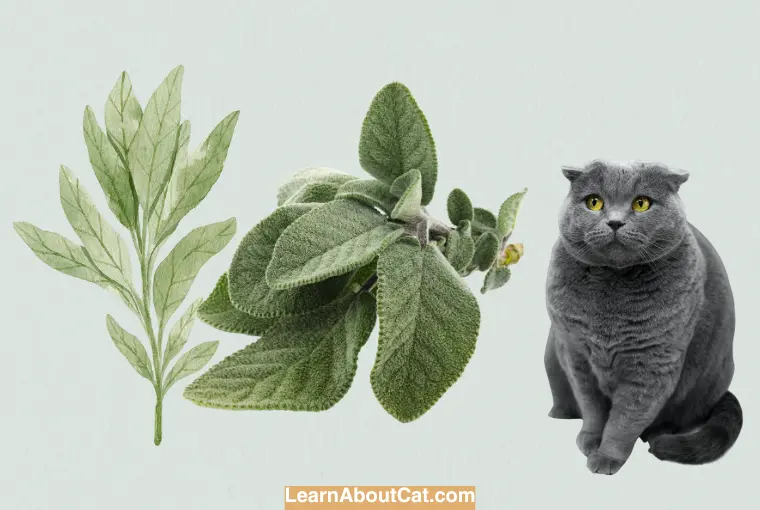
Although, sage oils, like several oils, can cause issues for cats. Do not heat sage oils when your cat is nearby. When warmed, it may irritate the eyes, skin, and respiratory system. Moreover, you shouldn’t let your cat use sage oils.
Also, Check Out: Are Palm Leaves Poisonous to Cats?
Is Sage Safe for Cats?
Sage is okay for cats to consume only in small amounts. There is no apparent damage when your cat chews on a few sages leave. Sage doesn’t contain many nutrients, yet it offers a few advantages.
Your cat’s gastrointestinal tract is specifically designed for eating and digesting meat. Several shrubs and plants are still edible to cats. But since there are insufficient enzymes, they can’t convert sage leaves and their oil into sugars by breaking them down.
Sage can’t be digested by cats if they consume a greater quantity than necessary and it might be possible that they’ll puke.
You must be cautious not to introduce your feline to sage oils, even though either freshly cut or dried sage which you may cultivate in your backyard is considered non-toxic to cats.
Find Out: Can Cats Eat Aloe Plant? How To Keep Cats Away From It?
Does Sage Benefit Cats?
Sage will benefit your cat’s condition as far as it is consumed by it securely and in balance. The advantages of sage include:
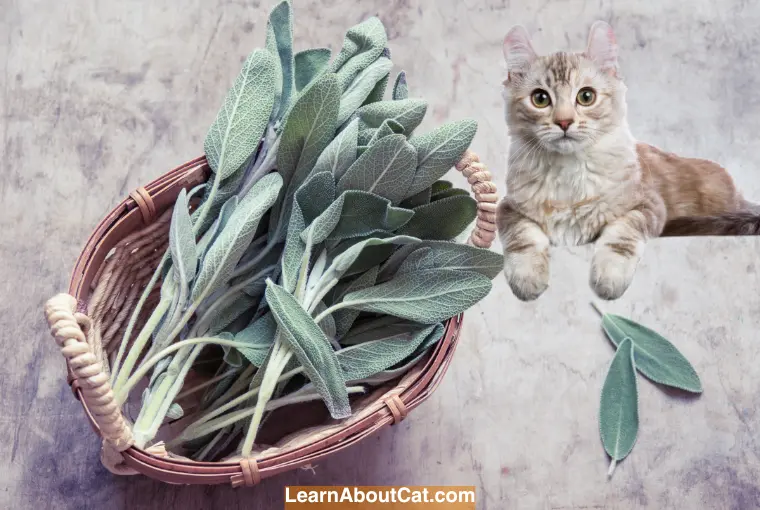
- Sage’s anti-spasmodic effects are well documented. They help the cat calm down and stop shivering by helping the cat’s body relax. There are also fewer convulsions and physical shocks. Moreover, sage is a decongestant. Sage causes the cat’s blood channels’ muscles to relax to encourage blood circulation and maintain the cat’s heart’s function.
- Sage’s anti-hidrotic characteristics make it a great at-home remedy for cats who struggle with hyperhidrosis. Cats with hyperhidrosis can benefit greatly from it.
- Sage has both antimicrobial and antibacterial qualities. It guards cats against several bacterial illnesses, such as Salmonella, E. coli, and many others.
- Sage is a fantastic option for cats suffering skin infections because of its astringent properties. Cats’ skin can be cleaned and stimulated with the aid of this sage. It closes open pores and stops unnecessary oil production.
- Sage helps treat conditions in cats that lead to sadness, heat flashes, and excessive perspiration.
- The diet of sage contains a lot of fiber. It can help to lessen digestive problems like constipation, bloating, and diarrhea in cats.
- Moreover, it possesses potent antifungal qualities. It aids in defending the cat against fungus-related illnesses (infections), like ringworm
- Sage is thought to improve cats’ cognitive and mental abilities. Also, it reduces the discomfort of the cat and supports the therapy for lung disease.
- Cats who consume sage run the risk of developing physiological problems with their neurological systems.
Risks of Feeding Sage to Cats
A cat’s wellness can suffer when it consumes excessive amounts of sage. Its neurological system may malfunction under extremely difficult conditions. As a result, you must bring your felines to the veterinarian right away if you see them devouring a bunch of sage.

The following are a few health risks that cats may encounter from consuming sage:
- If it was your cat’s first time-consuming sage, it can vomit or have diarrhea. This happens as a result of the herb’s unusual flavor for cats.
- Specialists identify sage as a plant high in salicylates. Salicylate, a natural component in it, is poisonous to cats.
- If cats consume sage in excess, they will experience acute pain and gastrointestinal problems.
- Cats with respiratory issues may experience discomfort from the fumes of the burnt sage.
- Cats should not consume sage oil since it contains ketones. The diabetic cat’s blood glucose levels elevate as ketones penetrate its system. Diabetic ketoacidosis, or DKA, is brought on by an increase in blood sugar levels in cats. In dire circumstances, DKA may also cause death.
How Much Sage Can I Feed My Cat?
Cats are carnivores and need a diet high in protein to live a long and healthy life. Sage is among the herbs that cats can safely consume in limit. But, if your cat has a habit to graze on vegetation for a long time, you shouldn’t give her easy access to sage bushes or leaves. Don’t let your cat get too close to sage plants, stems, dry sage, or sage-flavoured meals.
Sage can be a secure component of healthy and varied nutrition and is present in certain cat feeds and snacks. Sage’s distinctive flavour and aroma may be appealing to your cat and help provide an enriching experience for it.
Restrict your cat’s exposure to it just like you would with any herbs or plant, and only provide it occasionally as part of a healthy diet.
Also Read: Are Ferns Toxic to Cats?
Can I Burn Sage Around My Cat?
There isn’t much research looking into this, but flaming white sage hasn’t been found to have any harmful effects on cats. However, it’s not safe to burn sage around cats as it may cause burning risks and many other health issues.
However, if you have decided to burn the sage in your home, then protect your cats from the fumes of burning sage to reduce the chance of blisters and also protect your cat from the smoke of sage.
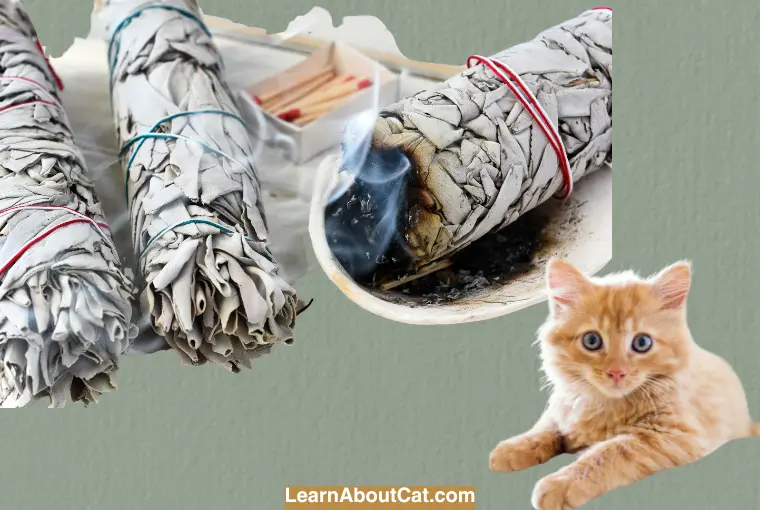
Is Burning Sage Safe for Cats?
There are pros and disadvantages to burning sage around cats.
The following are some benefits of smoking sage around cats:
- Improves sleep habits
- Increases the environment’s state of mind and energy
- Eliminates negative energy calms the body and reduces anxiety improves mental capacities
- Encourages general health and fitness
Yet, it can also have several drawbacks, including some of the following:
- Sage should not be burned for a variety of reasons, one of which is smoke.
- There is a considerable chance that your cat will suffocate or gasp whenever the sage is burning.
- The reason for this is that cats’ breathing and respiratory tracts are particularly sensitive. In a smoky environment, they can’t function properly.
- Besides, your cat’s cardiovascular system will be harmed by the smoke produced by burning sage. If cats are subjected to flaming sage for a long time, they may develop breathing problems.
- It’s recommended to stay away from burning sage if your cat seems to have respiratory issues. Be wary if your cat is pointing its paws or removing blazing sage from the pan.
- Cats with bronchitis and those having asthma are more susceptible to smoke and are more likely to experience major respiratory problems as a result.
- If the cat is having trouble breathing, sniffing, or has wet eyes, get it out of the area. Be careful to relocate the cat to a fresher space with sufficient clean air.
Frequently Asked Questions
What herbs can cats eat?
Cats can benefit from some herbs, but it’s vital to remember that not every herb is suitable for cats to eat. The following herbs are considered secure for cats:
Catnip
Cat thyme
Valerian root
Silvervine
Parsley
Dill
Licorice and cats’ root
Is purple sage harmful to cats? Is Sage Poisonous to Cats?
Sage plants come in a variety of varieties, some of which are poisonous while others are suitable for cats. Purple sage is a type of gourmet sage that cats can safely eat in moderation.
Some varieties of sage plants, like white sage, Spanish sage, rosemary sage, and many other includes essential oils and other substances that, if consumed in high quantities by cats, can be poisonous to them.
Can cats eat sage and onion?
The answer is no, cats shouldn’t consume sage and onion or any other foods made by humans that contain onion. Onion is poisonous to cats and may result in anemia, nausea, diarrhea, or other health issues. Little amounts of sage by themselves are typically acceptable for cats to consume, but it’s recommended to refrain from giving cats any meals that include onion or sage.
Can cats eat pineapple sage?
Yes, cats can consume pineapple sage because it is not harmful to them in moderation. However, if consumed in bulk, they may upset your cats’ stomachs.
Is sage oil safe for cats?
Sage oil shouldn’t be offered to cats because it is not healthy for them. Only cats without diabetes profit from sage oil. The sage plant’s oil includes ketones that are ingested by the diabetic cat, and its glucose levels increase. In the worst-case situation, DKA can result in the death of your cat.
Is sage similar to catnip?
Yes, sage and catnip are comparable. Both are members of the Mint family. Some have called it “catmint”. It has similarities to sage and thyme, two classic cooking plants, as well as an easy houseplant to cultivate.
Is Russian sage bad for cats?
Russian sage isn’t harmful to cats; in fact, its high fiber content can assist to firm up their stools. Yet cats just require a tiny bit of it as part of their nutrition.
Is sage safe for cats to smell?
Although a few cats may not enjoy the minty scent of sage, it is harmless for cats to sniff.
Conclusion
When you feed sage moderately, it is harmless for cats and does not harm them. Sage can cause stomach distress if consumed frequently or for a long time. Sage might be a beneficial addition to your cat’s well-balanced and varied diet. Always see your cat’s veterinarian if you have any questions about what is suitable for your cat. Each cat has slightly diverse requirements, and your cat’s veterinarian is the best person to ask about your cat’s well-being and medical background.
Moreover, you can give your cat sage to eat. It is better to avoid using essential oil and just feed fresh or dry sage leaves. Moreover, it’s not advised to burn sage around cats as it can cause a lot of health issues.
Related Posts:
Who is Isabella?
My name is Isabella, and I am a dedicated and knowledgeable cat enthusiast. With years of experience caring for cats and a deep love for felines, I made a mission to help other cat lovers navigate the challenges of cat ownership.


